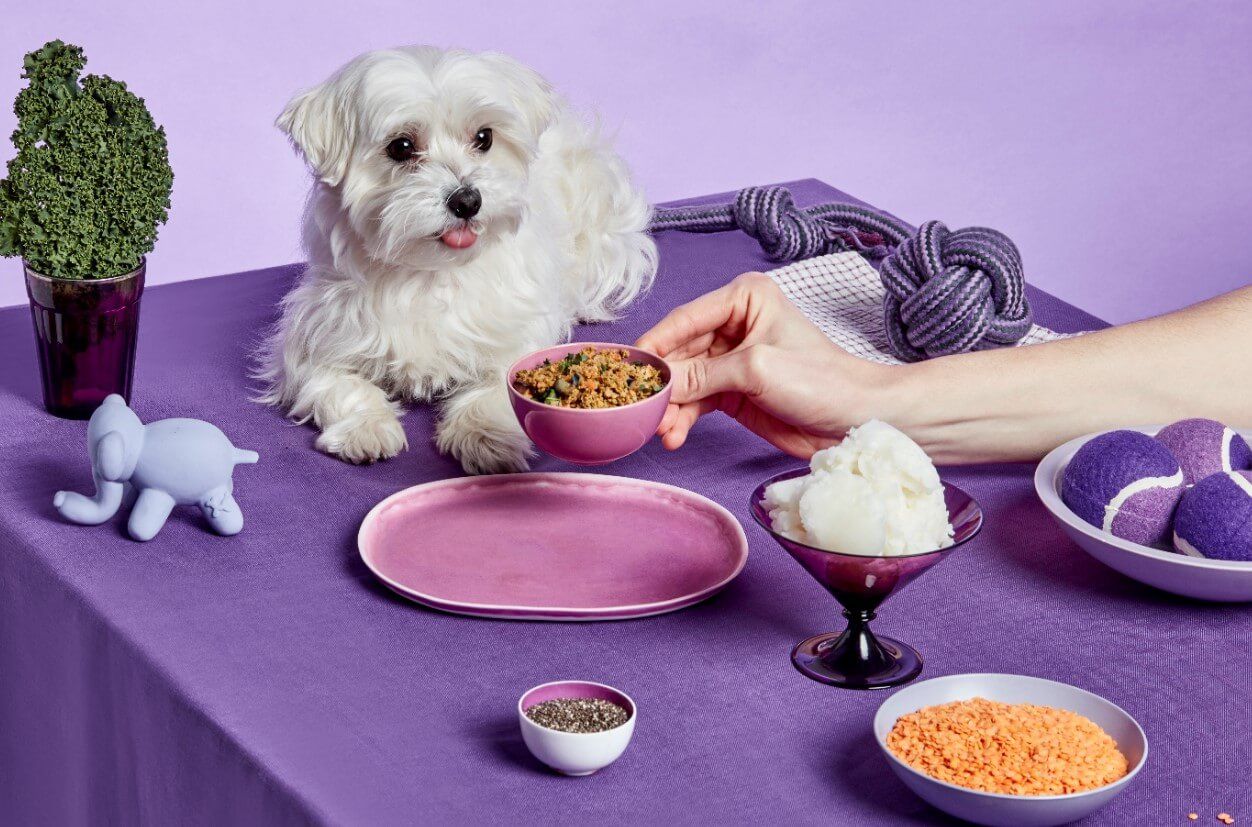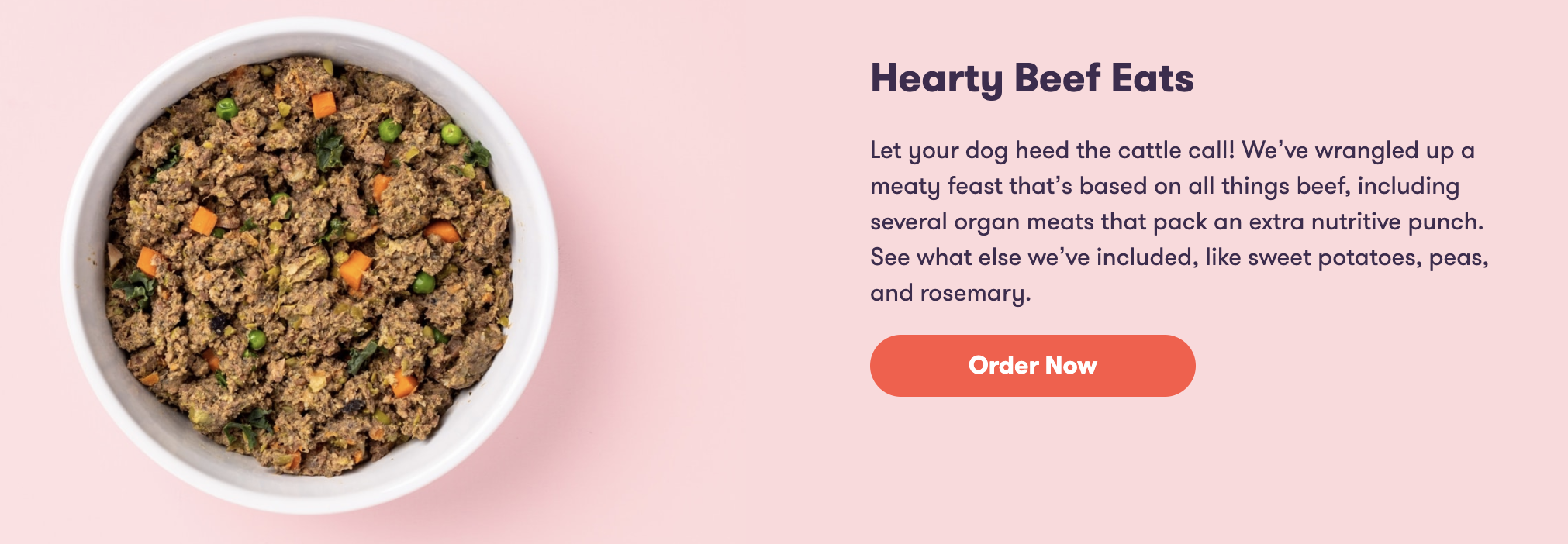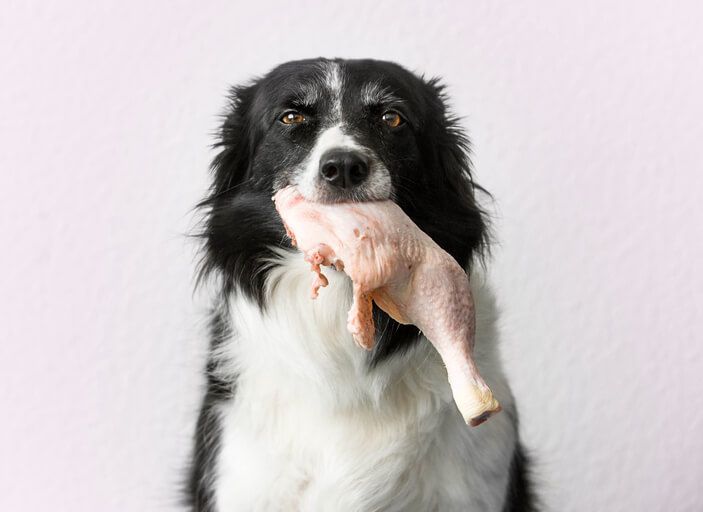Hey Ollie blog readers! We’re offering you an exclusive 60% OFF your starter box! Try now!
Turkey isn’t just for Thanksgiving—it can be a healthy, protein-rich option for your dog any time of year. But can dogs eat turkey safely? Yes, when it’s plain, fully cooked, and served without bones, skin, or seasoning. Turkey is a lean source of animal protein that supports muscle development, energy levels, and immune health. Whether you’re serving roasted turkey breast, ground turkey, or leftovers from your own meal, it’s important to prepare it in a way that’s safe for your pup. In this guide, we’ll cover the benefits, risks, and vet-approved tips for feeding turkey to dogs the right way.
Can Dogs Eat Turkey?
Yes, dogs can eat turkey—but only if it’s prepared safely and served plain. Turkey is a lean, high-protein meat that many dogs can tolerate well. In fact, turkey is often included in commercial dog food and fresh food formulations because it’s rich in essential amino acids and low in fat when skin and visible fat are removed.
But not all turkey is created equal when it comes to your dog’s safety. The way turkey is cooked and seasoned can make a big difference.
According to the American Kennel Club (AKC), “Plain, cooked turkey can be a healthy treat for dogs, but it must be free of bones and excess fat.”
What Parts of Turkey Can Dogs Eat?
Dogs can safely eat:
- Cooked turkey breast or ground turkey
- Plain turkey meat with no seasoning
- Leftover turkey that’s free of bones, skin, garlic, onions, or gravy
Avoid giving your dog:
- Turkey skin, which is high in fat and may cause pancreatitis
- Cooked turkey bones, which can splinter and cause choking or internal injury
- Seasoned turkey, especially those cooked with onions, garlic, butter, or salty rubs
Even small amounts of butter, salt, or garlic can lead to stomach upset—or worse, toxicity—in dogs.
Is Turkey Good For Dogs?
Yes, turkey can be good for dogs when it’s cooked simply and served in moderation. Turkey is a lean source of animal protein that supports muscle development, immune function, and energy levels. It’s rich in essential nutrients dogs need for daily health—including amino acids, B vitamins, and important minerals.
“Turkey is a high-quality protein that’s generally well tolerated by dogs,” says Dr. Korinn Saker, DVM, Ph.D., a veterinary nutritionist. “It offers nutritional value similar to chicken, but with slightly lower fat content when skin is removed.”
Key Nutrients in Turkey That Benefit Dogs:
- Protein: Supports muscle maintenance, organ function, and a healthy immune system
- Niacin (Vitamin B3): Helps convert food into usable energy
- Vitamin B6: Essential for enzyme function and hormone balance
- Phosphorus: Supports strong bones and teeth
- Selenium: Acts as an antioxidant and supports metabolism
These nutrients are especially helpful for active dogs, puppies in growth stages, and older dogs who need more digestible protein sources.
Health Benefits of Turkey For Dogs
Turkey is more than just a lean protein—it delivers real health benefits for dogs when it’s cooked plainly and served in appropriate amounts. This poultry powerhouse provides essential nutrients that support your dog’s muscles, metabolism, and immune system, all while being easy to digest and low in fat.
According to the American Kennel Club, “Turkey is a common ingredient in commercial dog food because it is rich in protein and low in fat, making it a good option for many dogs.”
1. High-Quality Protein Supports Muscle Strength
Turkey contains all the essential amino acids your dog needs for muscle repair and maintenance. Protein is especially important for active dogs, growing puppies, and aging dogs that need help maintaining lean muscle mass.
2. Energy Boost from B Vitamins
Turkey is a natural source of niacin (B3) and vitamin B6, both of which help convert food into energy. These B vitamins also support healthy brain function and hormone regulation.
Dogs that don’t get enough B vitamins can become sluggish, irritable, or experience poor appetite—turkey helps fill that nutritional gap.
3. Immune System and Metabolism Support
Turkey provides selenium, a trace mineral that plays a key role in protecting cells from oxidative damage and supporting thyroid function. A healthy thyroid helps regulate energy levels and metabolic rate.
4. Strong Bones and Teeth
Turkey is rich in phosphorus, which works alongside calcium to keep your dog’s bones and teeth strong. While turkey itself isn’t a significant source of calcium, it supports overall skeletal health when paired with a balanced diet.
5. Gentle on Sensitive Stomachs
Compared to beef or lamb, turkey is often easier for dogs to digest, making it a good protein option for pups with food sensitivities or digestive issues. It’s commonly used in limited ingredient diets and hypoallergenic dog foods.
6. Weight-Friendly and Low in Fat
Skinless turkey breast is especially low in fat, making it ideal for dogs on weight management plans or breeds prone to obesity. When you remove the skin and cook it without added oils, turkey offers lean nutrition without excess calories.
Bottom line: Turkey isn’t just safe for dogs—it delivers meaningful health benefits when prepared properly. That’s why Ollie uses turkey in some of our most popular fresh recipes. Every bite supports your dog’s vitality, without artificial additives or mystery meat.
Try Ollie Fresh Turkey Dog Food!
How To Safely Serve Turkey To Dogs
1. Only feed plain turkey
Plain turkey can be a delicious and nutritious treat for your pup. Most of the time when people cook turkey for the holidays or other special meals, the turkey is not plain. Butter, oil, sauces or seasonings can upset your dog’s sensitive stomach or worse. Onion, shallot and other members of the allium family can be toxic to your dog. If you are going to share turkey with your pup make it plain or keep a plain piece separate from the human turkey so your dog can enjoy it.
2. Avoid gravy and stuffing
While this may sound like a given since we said to only feed plain turkey, it’s still worth mentioning. Don’t give your pup turkey with anything in it or on it! Even as a special treat on a holiday. Gravy is loaded with butter and fat. This makes the turkey taste better to us but can make your dog sick. Too much fat can give your pup pancreatitis . You also want to avoid sharing stuffing. Bread, sausage, garlic, and onions aren’t good for your pup. If your dog is begging at the table, resist the temptation to share.
Since you don’t want your pup to feel left out, what you can do is offer plain turkey, a wet or fresh dog food made with turkey or a kong loaded with a dog appropriate snack. If you do want to pump up the flavor of plain turkey you can add dog-approved veggies like a little bit of mashed potato (just potatoes, not the kind you eat that are loaded with sour cream and butter) or sweet potato. If you wanted to make a special festive meal for your pup you could try mixing plain turkey, unsweetened dried cranberries and roasted or mashed sweet potato or butternut squash. If your dog likes plain green beans, you could add a few here as well.
3. Don’t share cooked bones
Even though you often see dogs chewing on or burying bones, note that these are NOT cooked turkey bones. Never ever give your dog a cooked Turkey bone to chew on. These bones can easily splinter causing cuts or scrapes in your pet’s mouth, broken teeth, internal injuries or blockages. You never want a festive dinner party to end with your pup in emergency surgery. Supervise your pups when there are bones on the counter and try to take out the trash after you are finished with the bones. If you like to, you can make bone broth from turkey bones before you throw them away.
4. Don’t feed turkey skin
The final thing you want to make sure you aren’t offering your pup is the turkey skin. Turkey skin can be quite fatty and can cause digestive upset or even pancreatitis if your pup gets too much. Like the bones, keep the skin away from your pup and dispose of it properly so your pup isn’t tempted to trash pick or counter surf!

Potential risks of turkey for dogs
Turkey is a great source of lean heart-healthy protein for many pups. At Ollie, we created our Turkey recipe to provide an easy way for pet parents to share this delicious protein with their pups. Our recipe contains kale, pumpkin, carrots, and blueberries to add lots of great vitamins and minerals to your dog’s diet.
Like chicken, dogs can have an allergic reaction to turkey. If your pup has never had turkey before you might want to introduce it slowly. If you are switching their food to Ollie from another brand, you will want to transition over a period of a few days. Mix the Ollie into their old food a little at a time until your pup is eating all Ollie. If you notice your pup is having any gastrointestinal issues or appears to have an allergy, stop feeding Ollie or any other form of turkey and consult with your vet.
In addition to using turkey as the main protein in your pup’s diet, you can also offer turkey as a training treat. The easiest way to do this is to roast a plain piece of turkey breast and cut it into small pieces. Your pup should be eager to work and earn these tasty morsels. You can also use turkey broth and leftover turkey along with healthy ingredients like whole wheat flour and oats to create a homemade biscuit. If you’re shorter on time or hate cooking, you can purchase treats made from turkey. There are plenty of options on the market from crunchy biscuits to chewy jerkies. Make sure to read the ingredients before offering these treats to your dog. You want to find treats with high-quality ingredients, not cheap fillers.

If you are cooking turkey specifically for your dog, remember to keep it plain so that your pup can enjoy it safely. Cooking for your pup can be a great bonding experience. You can sit together and wait for the turkey to be ready, play training games or just enjoy each other’s company.
The Ollie blog is devoted to helping pet parents lead healthier lives with their pups. If you want to learn more about our fresh, human-grade food, check out MyOllie.com.
Tagged As:

The nutrition your dog needs,
the food they want.

Enjoying our articles? Subscribe our Newsletters and get new articles directly to your inbox
You might also like
26 August 2025
4 MINS READ
Is Fresh Dog Food Safe?
If you’re thinking about switching your dog to a fresh food diet, you might be asking yourself: “Is fresh dog food safe?” It’s a smart question—because feeding fresh means you’re worki…
by Ollie Pets
26 August 2025
4 MINS READ
How Do I Know How Much Fresh Dog Food To Feed?
If you’ve switched your pup to fresh food, you’re probably wondering: “How much fresh dog food should I feed?” It’s not as simple as scooping kibble from a bag—fresh food is more nutri…
by Ollie Pets
26 August 2025
4 MINS READ
Do I Need To Cook Fresh Dog Food?
If you’ve just started exploring fresh dog food, you might be wondering: “Do I need to cook it?” or “Is it raw or already cooked?” It’s a common question, especially with so many pet f…
by Ollie Pets







